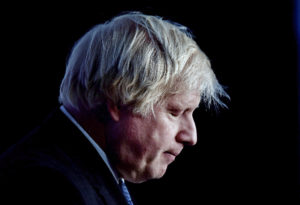The past few weeks have been a liminal period in British politics; one in which we have been presented with real political choices for the first time in a long time. The great spectacle of the Royal funeral achieved what state funerals are expressly designed to do: reassert the unity of the British nation in a shared, sacral ritual of belonging, beyond sterile rationality, as the tribe interred its fallen chief with great pomp and ceremony. But more, the fundamental contours of British politics were exposed by the near-simultaneous accession of both the King and Liz Truss.
In King Charles, we have a post-liberal monarch who furiously rejects the marketisation of ever more aspects of human life. There are, in his writings, elements of the “Tietjens Toryism” of Ford Madox Ford’s Parade’s End, whereby the paternalistic concern of the central character, the “last surviving Tory”, for social harmony and widespread prosperity delineate the point at which “the High Toryism of Tietjens [meets] the extreme Radicalism of the extreme Left of the Left”.
Yet on the other, baleful side of the ledger, we have been foisted with a career politician who seems to view the laziest Left-wing caricatures of Toryism as a political roadmap: a pure zealot of unrestrained capital with no vision of the good beyond libertarian think tank pamphlets and a burning faith in the might and power of the market’s invisible hand. Alas, Truss’s faith in the markets is not rewarded by the markets’ faith in her: the invisible hand has already reached down to flick her from the history books.
Her plan for massive borrowing relied on the faith of international opinion that it would be amply repaid by her simultaneous tax cuts for Britain’s very richest, and an economic boom occasioned by vague promises of future reforms. To pay for her budget, and for its unintended consequences, the Government now looks set to slash spending on the infrastructure and research and development projects on which long-term prosperity depends. Unfortunately for Truss and for the country, the international markets, the IMF, the Bank of England, and those notorious Left-wing radicals the Financial Times and the Economist recoiled in horror. When even the Telegraph warns that the ”Peronist policies” of a “a careless, ideological government” set on “a course of sheer madness” put “this country in serious jeopardy”, we can be certain that we are in a new era. There are fashions in economics as in all things; outside the Conservative party, the rest of the world has firmly rejected the Seventies dogmas that brought Britain decades of stagnation and underinvestment — even in a far rosier international climate than the one we currently inhabit.
It is like the story of The Monkey’s Paw: after so long demanding a Conservative leader committed to bold and decisive action, the one the party chose was a suicide bomber. The only questions now, surely, are how much harm she can cause the country in the time remaining, and whether she will bring down the Conservative party with her. Because Truss forgot that the British public also has a vote. Dreading an economic winter harder than anyone has previously experienced, the voting public looks to have decisively rejected Trussonomics, and will deliver Labour the greatest parliamentary majority in British political history. The story of the past few years, from Brexit to the 2019 Conservative landslide, and now Labour’s coming victory, is of a British public desirous of radical change, and of a political class struggling to comprehend what this means, let alone how to deliver it. The Conservatives were elected on a simple mandate to reform Britain’s failing economic model and slash our current, record-high levels of immigration; instead, Truss is doubling down on both.
It is a matter of great, cosmic irony that in the same week Truss lost the Red Wall with a platform encapsulating everything the Brexit vote was against, Keir Starmer won it back with a postliberal message, centred on direct investment in state capacity, public services and home ownership through the simplest supply side reform, housebuilding. The libertarian think tanks who so gleefully rushed to take ownership of her budget when it was announced, must now take ownership of the results: they have destroyed the party they have hollowed out and stripped of any vestiges of Tory thinking.
Though a disaster for the Conservative party, the mini-budget was, apparently, a triumph for the IEA, the free-market think tank which has long advanced this ideology — as well as having groomed Truss and Kwarteng. And as the party has been warned time and time again, what they have cooked up is as repellent to ordinary voters as it is to traditionalist Tories.
The ideologues have crashed Britain, and the Conservative party, into a cliff, and the party now requires time out of office to relearn Toryism from first principles, shorn of the libertarian accretions that have driven it to chaos and the edge of extinction. The wreckers must be entirely driven out from British conservatism, in whose stolen clothes they have made mischief for far too long. But until then, there is no Tory case for voting for the Conservative party. A party that puts its own short-term survival above the national interest has no business running a country.
It is the tragic irony of British conservatism in 2022 that just as the only reason to now vote Tory is to own the Cons (like the IEA’s Julian Jessop and Kristian Niemitz welcoming Truss’s push for massively increased immigration), so does the only means of restraining the self-destructive zealotry of the economic liberals now seem to lie within the Labour Party. Some of the warmest responses to Starmer’s conference speech, in which he warned that “decline is not inevitable” and promised that the Labour Party is now the party of reindustrialisation, national self-reliance, home ownership and support for ordinary people came from Tory commentators aghast at Truss’s radical liberal vision.
It is those Tories representing the party’s paternalist social conscience who have been most struck by the contrast between Truss’s wrecking ball and Starmer’s softly postliberal vision. For as Gavin Rice of the Conservative Centre for Social Justice think tank observes, “Starmer just laid out a postliberal Brexit: controlled immigration, pride in community, democratic control, buying, making and selling more in Britain and the potential of active government. Tories shouldn’t be allowing them to control this turf.” But this is the path they chose, and when the voters punish for them for it, the party only has itself to blame.
It is remarkable to observe that Truss’s mentors in the IEA still found time to release a paper — Taking Liberties: Why postliberals are wrong about personal freedom, by Jamie Whyte — denouncing the rival postliberal trend in conservative thought: the very same political philosophy whose faintest echoes have rewarded Labour with the prospect of a historic landslide. The paper did not gain much traction, true: it was a poorly argued mishmash of philosophical sophistry against an amalgamated strawman version of very distinct political tendencies. But that they thought it necessary to release is in itself indicative of where the intellectual energy now lies within conservatism, on both sides of the Atlantic.
Yet the paper presents a fascinating insight into the worldview of a crankish doctrine the British public so visibly and overwhelmingly rejects. Throughout, the author rejects any notion of a common good, the essential building block of both modern postliberalism and traditional Toryism, associating the idea with compulsion at the hands of the state. So, the author writes, postliberals “believe politicians should take a view about the good life – specifically, the postliberals’ traditionalist view – and use the powers of the state to make sure that people live it”, in what he describes as a “proposed way-of life authoritarianism”, and a “regime in which politicians use state power to make them live ‘the good life’”.
To reach this conclusion, the author conflates the two very different American and British postliberal strands of thought, currently at war with each other through a heated exchange of open letters in the American Conservative. He adopts the framing of the harder-edged, American postliberalism’s vision of the Catholic-administrative state to condemn British postliberalism, which is in truth a conservative variant of socialism, infused with a traditionalist Tory discomfort with modernity, and drawn from our nation’s distinct historical path. British Postliberals, like other social democrats, do indeed believe that the nation’s good as well as prosperity would be enhanced if everyone were to be given support by the state to settle down, form families and own their own homes: this is, or was, a very basic tenet of Toryism, too. But this is quite a different thing from state compulsion: there will be no roaming squads of tweed-jacketed postliberals forcing otherwise happy singletons to marry, and frogmarching them into suburban semis.
But then, even this very basic expression of the common good is a vision of hell to the radical IEA liberal, who warns that “policies that cause more people to marry, perhaps by way of tax incentives, can still harm them. For being in a good and sound marriage involves forgoing other sources of happiness. John might also gain happiness from travelling the world alone” or “from seducing strangers at nightclubs”. Indeed he might. Yet reordering the British economy, and the lives and prosperity of the British people, around our hypothetical John’s mission of global seduction is simply not conservatism in any form, and a party that can prioritise this philosophy over the national good fully deserves the disaster coming its way.
But even as the paper asserts that the postliberal claim that liberalism leads to social atomisation and the construction of obstacles to the formation of family life is false, it argues against state support for those who wish to do so, in the seeming belief that helping those who wish for a secure and settled domesticity to attain it will somehow impinge on John’s absolute freedom. We should be clear: a postliberal government would not prevent John, or other liberals, doing as they wished with their own lives; it would instead simply support those who wished for the very basic goods of home ownership and domestic comfort and security to attain them. Yet even this is apparently anathema to the IEA, and we must now sadly assume, to our own notionally conservative government.
Coercion by global market forces is, simply, no liberation. It is this exact vision, of the entirety of social life from the family to the nation being subject to and torn apart by the destructive power of the unrestrained market, that postliberals as well as British voters reject; and it is precisely this outcome which liberals in their purest form, like Truss and the think tanks which formed her worldview, try to summon into being through ever more painful rites of destruction and self-sacrifice. If earthly salvation has not yet been attained, then ever more of what society holds good must be hurled onto the flames: this is neither politics nor economics, but the frustrated religious impulse that drives all liberalism.
Like communists, who wave away the misery and destruction every attempt to apply their vision in practice has so far entailed, free market fundamentalists like Truss and the think tanks around her assert that the only problem with their failed vision is that it has never yet been properly applied. Instead, guided by Tory pragmatism, postliberalism rejects fantastical visions of the future in favour of a future partly shaped by the forms of social and economic life that existed before capitalism: a world which was far from perfect, but whose failings are known and therefore capable of being effectively ameliorated.
But as it stands, there is no home for postliberal Tories, always wary of the free market as a force destructive to tradition and social order, in the Conservative party that now exists: instead, we must be grateful that when given free rein, the libertarians have discredited their doctrine as electoral poison in a few short and tumultuous days. Just like the state funeral, Truss’s accession was itself a great symbolic moment. It marked the nadir of Tietjens Toryism as a philosophical tradition within the Conservative party, and the total victory of a radical form of economic liberalism which, like an alchemist turning gold into lead, has transmuted 2019’s electoral landslide into disaster. If any Tory case can be made for Truss, it is a purely accelerationist one: that the catastrophe she has brought in tow may finally exorcise Thatcher’s unquiet ghost, and allow the party — or whatever form of conservative politics succeeds the party that put her into power against so many warnings — to reflect upon what Toryism actually means.
But until then, it is Starmer’s Labour, which learned the lessons of Brexit and 2019, that has rejected radical economic liberalism and pledged to deliver the common good. Certainly, there is still space for him to lose: just as the Conservatives failed to restrain their economic liberal extremists, so must Starmer restrain the extremist social liberals in Labour’s ranks whose views the ordinary voter deems equally strange and repulsive. But on basic bread and butter policy, the contrast between a Labour party pledging to build more homes, and a Conservative government about to lose many Britons the homes they already own is absolute.
If they achieve just this one aim, let alone their promises to deliver a Brexit that works for the entire country, or to return manufacturing capacity to British shores through state investment, then Labour deserves to win the landslide victory the Conservatives chose to squander. In choosing Truss, the Conservative party chose to make the Tory case for Labour.
Disclaimer
Some of the posts we share are controversial and we do not necessarily agree with them in the whole extend. Sometimes we agree with the content or part of it but we do not agree with the narration or language. Nevertheless we find them somehow interesting, valuable and/or informative or we share them, because we strongly believe in freedom of speech, free press and journalism. We strongly encourage you to have a critical approach to all the content, do your own research and analysis to build your own opinion.
We would be glad to have your feedback.
Source: UnHerd Read the original article here: https://unherd.com/




